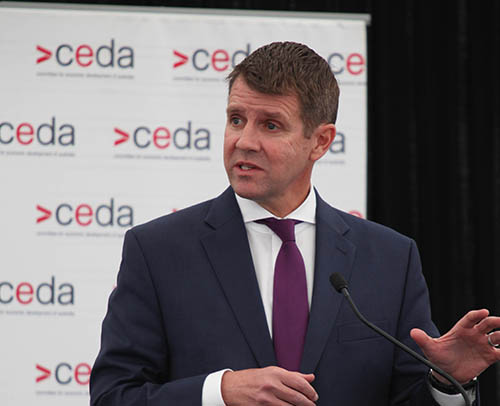Explore our Climate and Energy Hub
25/08/2016
 Mr Baird said that NSW had come a long way in recent years, but that now the Government needed to look towards the future – with the help of Jobs for NSW, the private sector-led and Government-backed initiative launched in 2015.
Mr Baird said that NSW had come a long way in recent years, but that now the Government needed to look towards the future – with the help of Jobs for NSW, the private sector-led and Government-backed initiative launched in 2015.
“NSW is back leading the nation. If you remember where we were just a few years ago – although five and a half years does seem like quite a long time in politics nowadays – NSW had the slowest economic growth and the slowest jobs growth of any state in the nation. And that has turned around,” he said.
“Collectively, NSW now has the largest economy in the country, over $500 billion; in addition, it retains an AAA credit rating. And that’s not necessarily the easiest thing to do these days.”
Mr Baird said that jobs growth in the state had come from a place that many might not expect: small- and medium-sized businesses.
“Over the last six years, about 3.1 million jobs has grown to 3.6 million jobs… In six per cent of businesses, that’s where all the growth has been. And that’s in businesses that are growing in the SME space, and new businesses.”
He said that the Government’s plan was to be “more strategic” and focus on these six per cent of businesses to facilitate jobs growth.
“The sort of jobs we’re looking for, they need to be resilient; that is, there for the longer term, inclusive, providing as many opportunities as possible… Those that bring the highest productivity and the highest quality of life,” he said. “So that’s the package, that’s the goal. How are we going to do it?
“Jobs for NSW has done a lot of analysis and a lot of work.
“On one side, we want to bring more people to visit and study and work – and the capital that comes with that – into NSW, and into the sectors we want to focus on. That’s tourism, international education, creative industries, infrastructure, digital innovation and the regional HQs.
“But at the same time, in many respects our economy has become a bit insular, and we want the export side to grow and flourish. There’s a number of sectors there, and selling more products to Asia – in terms of agriculture, advance manufacturing, life science such as health, financial services and environmental technologies. Across all of those areas, Sydney and NSW have competitive advantages.”
Mr Baird noted that the global economy was moving from West to East: “It’s shifting into the Asia Pacific, and particularly China and India. By the time we get to 2020, the expectation is just under 30 per cent of the global economy will be in China and India.”
“As that growth comes, how are we positioned in terms of our services, both inwards and outwards, to take advantage of that?”
He said that the state’s competitive advantages in financial services, wealth management and tourism would put Sydney and NSW in an advantageous position. “I mean,” he joked, “If you’re trying to sell Melbourne - who wants to go to Melbourne for heaven’s sake? Great to have everyone from Melbourne here… This is what a real day looks like.”
Mr Baird also said that Jobs for NSW would be focusing on providing support to emerging and more established start-ups that were moving into the “gazelle” space – that is, start-ups that had seen 20 per cent growth every year, for three years in a row.
“Part of the (Jobs for NSW) work suggests availability of capital is a challenge. If the start-ups start here, we need to facilitate their growth because we want to feed back to that jobs growth. How do we continue to ensure that start-ups start and that they finish – that as many as possible move into the gazelle space,” he said.
“One million more jobs sounds like a significant target – and it is, it is a big target, it’s a stretch target. But underneath that is the important point that from a Government point of view you can’t stand still. Anyone that stands still, and you keep doing what you’re doing, well it’s not long until you start to fall behind.
“We want to support those businesses that are growing.”
Chair of Jobs for NSW David Thodey elaborated on the Premier’s address with some of the specific initiatives the Government was considering implementing to support start-ups moving into the “gazelle” space.
“So, these wonderful gazelles. I’m not quite sure who made up the term gazelles. We tried to Australianise it, but couldn’t find the right animal. Gazelles are those wonderful companies, somewhere between 20 to a couple hundred people, but they’re growing at about 20 per cent each year for a three-year period, either in employment or profit,” he said.
“But they sometimes hit the wall because they can’t get access to capital. The banks look at them and say, ‘You’re a bit high risk’. So how can we come in and help them get through that capital requirement?
“We’ve got a couple of programs. The ‘accelerating growth loan pilot’… We’re just going to try and see if we can help them get over that hump. And the bigger one is the ‘gazelle loan program’… That loan can go up to $5 million (for a single business).
“I want to be clear: these are loans. They are not grants. And we think it can work, we can tweak the parameters a bit, and hopefully we can partner with the banks as well and get the private sector involved – I think we can do a lot here.
“We need to be open to new ways of thinking and collaborating.”
